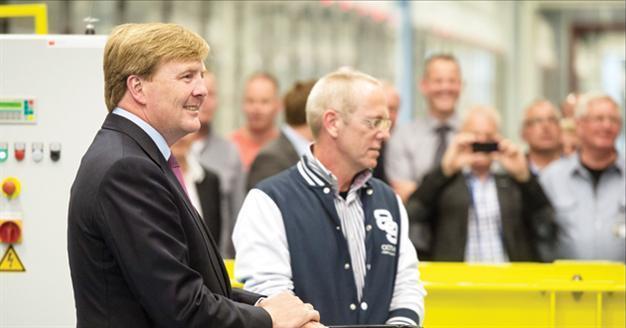Eurozone industrial output rises in May
BRUSSELS - Reuters

Dutch Prince Willem-Alexander (L) is seen during the opening of a production hall.
Output at eurozone factories grew in May, but not enough to make up for falls earlier in the year as production in France and the Netherlands sank, the latest sign that the euro zone debt crisis is also eating away at northern European economies.
Industrial production in the 17 countries sharing the euro rose 0.6 percent in May from April,
the EU’s statistics office Eurostat said on Thursday, beating expectations of economists polled by Reuters, who had forecast no growth in the month.
But Eurostat revised downward the reading for April to a 1.1 percent drop from a 0.8 percent decrease, the deepest fall so far this year, highlighting the weak demand for goods as the euro zone suffers from its 2-1/2 year debt crisis.Industrial output fell 2.1 percent in France in May, a drop second only in the zone to Slovenia’s 3.2 percent slide.
Production also fell 1.6 percent in the Netherlands, where the economy is expected to shrink 0.9 percent this year, according to the European Commission and making it the worst performing economy in the euro zone’s wealthy, northern core.
A 2.3 percent fall in energy production in May for the euro zone as a whole, after a 5.3 percent rise in April, appeared to explain the modest reading as output rose for consumer goods and capital goods, such as machinery to make other products.Germany, Europe’s largest economy that has shown the most resilience to the debt crisis, saw industrial production rise 1.5 percent in May but still not enough to compensate for a 2 percent fall in April. Italy painted a similar picture, rising 0.8 percent in May after also falling 2 percent in April.
Germany hopeful
“German exports should climb again in the coming months, as we do not expect global demand to slump. That said, the German upswing has lost momentum amid the crisis in the eurozone,” Ulrike Rondorf, an economist at Commerzbank, wrote in a note to clients last month on the German export outlook.
Ireland, which the eurozone is eager to hold up as a success story after Dublin took a bailout in 2010, notched up its third consecutive month of solid output gains, with industrial production rising 1.4 percent.
